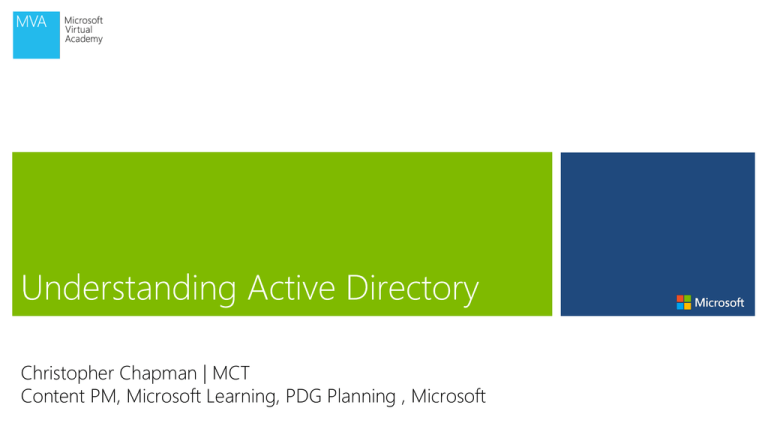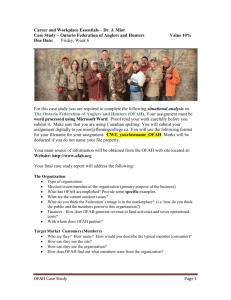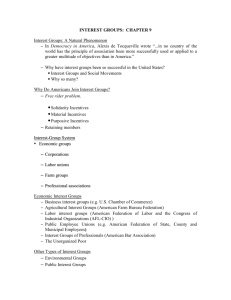
Christopher Chapman | MCT
Content PM, Microsoft Learning, PDG Planning , Microsoft
Microsoft
Virtual
Academy
Active Directory Federation Services
(AD FS)
Module Overview
• AD FS Overview
• AD FS Deployment Scenarios
• Configuring AD FS Components
Lesson 1: AD FS Overview
• What Is Identity Federation?
• What Are the Identity Federation Scenarios?
• Benefits of Deploying AD FS
What is Identity Federation?
Identity federation is a process that enables distributed
identification, authentication, and authorization across
organizational and platform boundaries
An identity federation:
Requires a trust relationship between two organizations or entities
Allows organizations to retain control of:
Resource access
Their own user and group accounts
What Are the Identity Federation Scenarios?
Federation for
business-tobusiness (B2B)
Federation for businessto-consumer or businessto-employee in a Web
single sign-on scenario
Federation within
an organization
across multiple
Web applications
Benefits of Deploying AD FS
AD FS provides the following benefits:
Enables improved:
Security and control over authentication
Regulatory compliance
Interoperability with heterogeneous systems
Works with Active Directory Domain Services (AD DS) or Active Directory
Lightweight Directory Services (AD LDS)
Extends AD DS to the Internet
Demonstration: Installing AD FS
•
In this demonstration, you will see how to install the Active
Directory Federation Services Server Role
Lesson 2: AD FS Deployment Scenarios
• What Is a Federation Trust?
• What Are the AD FS Components?
• How AD FS Provides Identity Federation in a B2B Scenario
• How AD FS Traffic Flows in a B2B Federation Scenario
• How AD FS Provides Web Single Sign-On
• Integrating AD FS and AD RMS
What Is a Federation Trust?
AD DS
Web
Server
Federation Trust
Account
Federation
Server
Account Partner
Organization
Resource
Federation
Server
Resource Partner
Organization
What Are the AD FS Components?
AD FS Components:
AD DS domain controllers
Account federation server
Account Federation Service Proxy
Resource Federation Server
Resource Federation Server Proxy
AD FS Web Agent
How AD FS Provides Identity Federation in a B2B
Scenario
INTRANET
FOREST
PERIMETER
NETWORK
AD DS
Resource
Federation
Server
Proxy
Account
Federation
Server
Proxy
Account
Federation
Server
Contoso
Resource
Federation
Server
Federation Trust
AD FSenabled
Web Server
Online Retailer
How AD FS Traffic Flows in a Business to Business
Federation Scenario
5
AD DS
3
Account
Federation
Server
Contoso
1
Federation Trust
2
Web
Server
4
Resource
Federation
Server
Online Retailer
Lesson 3: Configuring AD FS Components
• Federation Service Configuration Options
• What Are AD FS Trust Policies?
• Demonstration: Configuring the Federation Services for an
Account Partner
• AD FS Web Proxy Agent Configuration Options
• What Are AD FS Claims?
Federation Service Configuration Options
To implement the federation service:
Create a trust policy for both the resource and account partners
Create organizational claims
Create account stores
Create and configure applications
What Are AD FS Trust Policies?
Trust policies are the configuration settings that define how to configure a federated
trust and how the federated trust works
Resource partner trust policies include:
Token Lifetime
Federation Service URI
Federation Service endpoint URL
The option to use a Windows trust relationship for this partner
In addition, the account partner trust policies include:
Location for a certificate to verify the resource partner
Options for configuring how resource accounts are created
Demonstration: AD FS Initial Configuration
•
In this demonstration, you will see how run the AD FS
Management Snap-In and run through the initial configuration
steps.
AD FS Web Proxy Agent Configuration Options
AD FS Web Proxy Agent Configuration Options:
1
Install the AD FS Web Agent on the IIS server
• Windows Token-based authentication requires ISAPI extensions
• Claims-aware authorization can authenticate natively with ASP.NET
2
Determine how to collect user credential information from browser clients
and Web applications
What Are AD FS Claims?
Claim Type
Description
• UPN: indicates a Kerberos version 5 protocol-style user
principal name (UPN), for example: user@realm
Identity
• E-mail: indicates Request for Comments (RFC) 2822–style email names of the form user@domain
• Common name: indicates an arbitrary string that is used for
personalization
Group
• Indicates membership in a group or role
Custom
• Indicates a claim that contains custom information about a
user, for example, an employee ID number
Module Review and Takeaways
• Review Questions
• Summary of AD FS
Thanks for Watching!
©2013 Microsoft Corporation. All rights reserved. Microsoft, Windows, Office, Azure, System Center, Dynamics and other product names are or may be registered trademarks and/or trademarks in the
U.S. and/or other countries. The information herein is for informational purposes only and represents the current view of Microsoft Corporation as of the date of this presentation. Because Microsoft
must respond to changing market conditions, it should not be interpreted to be a commitment on the part of Microsoft, and Microsoft cannot guarantee the accuracy of any information provided after
the date of this presentation. MICROSOFT MAKES NO WARRANTIES, EXPRESS, IMPLIED OR STATUTORY, AS TO THE INFORMATION IN THIS PRESENTATION.




